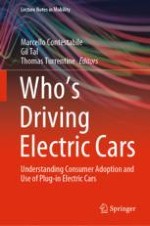2020 | OriginalPaper | Buchkapitel
Beyond Consumer Innovators: Adoption of Plug-in Vehicles by Mainstream Consumers in the U.K.
verfasst von : Stephen Skippon, George Beard
Erschienen in: Who’s Driving Electric Cars
Aktivieren Sie unsere intelligente Suche, um passende Fachinhalte oder Patente zu finden.
Wählen Sie Textabschnitte aus um mit Künstlicher Intelligenz passenden Patente zu finden. powered by
Markieren Sie Textabschnitte, um KI-gestützt weitere passende Inhalte zu finden. powered by
